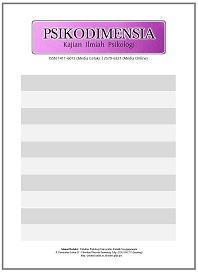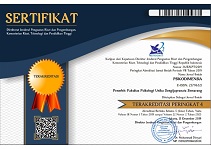The Influence of Social Support and Self Esteem on Subjective Well-Being in Elderly of Pamona Utara Sub-District Poso Regency
Abstract
Keywords
Full Text:
PDFReferences
Oladipo. S.E., Balogun S.K. (2012). How Suitable is The Satisfaction With Life Scale For Use On Adolescents In Nigeria?. Science Journal of Psychology. (No.22766278) doi: https://www.researchgate.net/publication/277739499_How_Suitable_is_the_Satisfaction_with_Life_Scale_For_Use_On_Adolescents_in_Nigeria
Badan Pusat Statistik Provinsi Sulawesi Tengah. (2015). Jumlah populasi lansia di Sulawesi Tengah. Sulawesi Tengah : BPS Sulteng.
Diener, E. R. A., Larsen, R. J., & Griffin, S. (1985). The Satisfaction with Life Scale. Journal of Personality Assessment, 49, 71-75.
Diener, E., & Seligman, M. E. (2002). Very Happy People. Psychological Science, 13, 81-84.
Diener, E., Oishi, S. and Lucas, R.E. (2009) Subjective Well-Being: The Science of Happiness and Life Satisfaction, 63-73. doi:https://greatergood.berkeley.edu/images/application_uploads/Diener-Subjective_Well-Being.pdf.
De Carvalho. W.H., et al. (2013). Structural validity and reliability of the Positive and Negative Affect Schedule (PANAS): Evidence from a large Brazilian community sample. Revista Brasileira Psiquiatria. doi: https://www.researchgate.net/publication/254261472_Structural_validity_and_reliability_of_the_Positive_and_Negative_Affect_Schedule_PANAS_Evidence_from_a_large_Brazilian_community_sample
Kang Sun-kyung. (2011). Effects of Social Activities and Religion /Spirituality on Well‐Being in Life among the Korean Elderly, Research - supported by Sogang University, Grant (No. 20091106).
Kementerian Kesehatan Republik Indonesia. (2017). Analisis Lansia Di Indonesia. doi:http://www.depkes.go.id/download.php?file=download/pusdatin/lain-lain/Analisis%20Lansia%20Indonesia%202017.pdf.
Lubis, BR. H.S. (2011). Hubungan Self Esteem dengan Subjective Well Being Karyawan UIN Syarif Hidayatullah Jakarta. Skripsi : Fakultas Psikologi, Universitas Islam Negeri Syarif Hidayatullah, Jakarta.
Ndima, V.L.N. (2017). The dimensionality of the Rosenberg Self-Esteem Scale (RSES) wit South African University Students. MA Research Psychology. Faculty Of Humanites: University Of Pretoria. doi: https://repository.up.ac.za/handle/2263/61369
Osman, A., Lamis. A.D., Freedenthal. S., Gutierrez. M.P., Cassil-McNaughton.M. (2014). The Multidimensional Scale of Perceived Social Support: Analyses of Internal Reliability, Measurement Invariance, and Correlates Across Gender. Journal of Personality Assessment, 96:1, 103-112. doi: https://www.researchgate.net/publication/257348234_The_Multidimensional_Scale_of_Perceived_Social_Support_Analyses_of_Internal_Reliability_Measurement_Invariance_and_Correlates_Across_Gender
Perera, K. (2001). Self-Esteem is the Key.
Pardhy, M., Rana, S., Mishra, M. (2010). Self Esteem and Subjective Wellbeing: Correlates of Academic Achievement of Students. The International Journal’s: Research Journal of Science & Management.
Suardiman, S. (2011). Psikologi Usia Lanjut. Yogyakarta: Gadjah Mada University Press.
DOI: https://doi.org/10.24167/psidim.v18i1.1789
Print ISSN : 1411-6073 | online ISSN : 2579-6321 View My Stats

This work is licensed under a Creative Commons Attribution 4.0 International License.




















